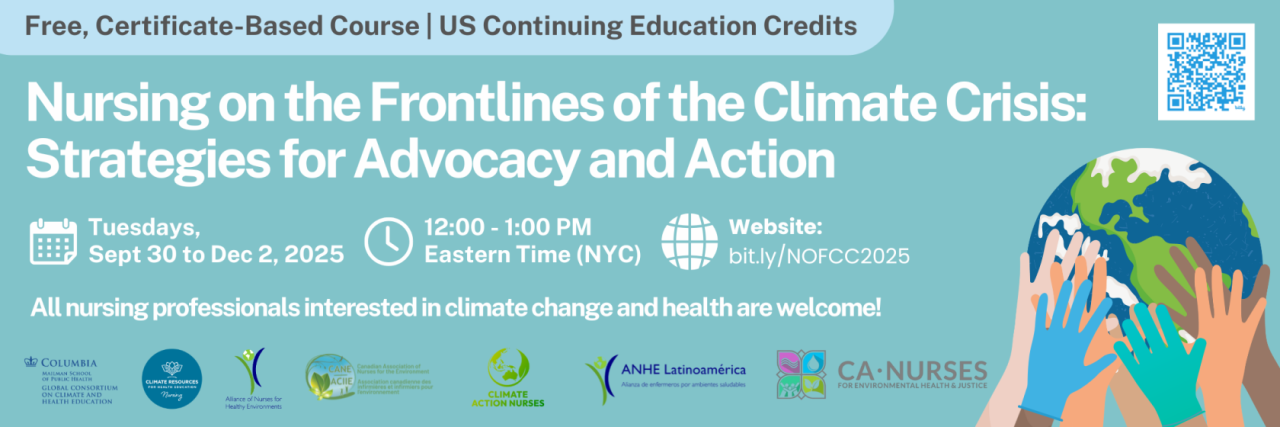

Climate change is impacting health and healthcare delivery globally and society’s ability to support healthy living. The effects of climate change on human health around the world is increasing the demand for a climate-informed nursing workforce as the impacts will only intensify in the coming years. The effects of climate change are already harming human health around the world, and impacts will only intensify in the coming years. Heat waves and rainstorms are becoming more deadly, disease outbreaks last longer and are seen in new regions, wildfire smoke from tinder-dry forests reduces air quality, and food and water security are threatened by extreme weather. There is an imperative for quick action on many fronts: to recognize and respond to climate-health threats; prevent climate change at its source by reducing heat-trapping greenhouse gas emissions; support “greener” systems throughout the economy, including healthcare; determine the health co-benefits of adaptation and mitigation; and communicate effectively about these issues to safeguard human health.
Climate change is also connected to the socially and economically burdensome epidemic of noncommunicable diseases (NCDs). One link between climate and NCDs is the excessively large number of deaths among people with NCDs in the weeks and months after a large storm, given the disruption to services and reduced availability of medicines. Another link is food and nutrition security. We are witnessing the erosion of agriculture as more frequent storms, drought episodes and damage to coral reefs undermine food and nutrition security globally. This leads to more consumption of cheap, low-quality food, leading to obesity and attendant NCDs. The massive agriculture industry in the world – especially for meat – uses huge amounts of gas and oil to make fertilizers and support mechanized agriculture. If we shift to a more plant-based diet, there would be benefits to health from reduced risk of NCDs, and benefits to the planet from reduced greenhouse gas emissions. Heat and drought lead to more wildfires and smoke, and pollution from vehicle emissions can trigger asthma and chronic respiratory disease. Transportation is largely by motorized vehicles using fossil fuels. Initiatives to increase alternative transport such as biking, walking, and rapid mass transport, which utilize the existing built environment, have potential co-benefits to health, energy security, tourism, and the planet. (Reference – Climate change and non-communicable diseases: two sides of the same coin – The Global Governance Project(link is external and opens in a new window))
To meet these challenges, current and future nursing professionals globally must understand the dynamics governing the interactions of climate and health, the level of scientific understanding of those interactions, and potential adaptation, mitigation, and resilience-building solutions, while carrying a respect for the processes and issues not yet fully understood. Furthermore, the nursing profession needs to be able to apply these principles to individual and population level health needs to devise individual and locally meaningful public health solutions. Education is key in the effort to increase knowledge and skills among nursing professionals, clinicians, public health practitioners, emergency responders, educators, healthcare leaders, and policy makers in order to build capacity and so they may continue to serve as trusted voices within their professions and institutions.
Nursing on the Frontlines of the Climate Crisis Course: Strategies for Advocacy and Action addresses this critical need and builds upon the foundational concepts of the first course, Nursing on the Frontlines of the Climate Crisis Course: Education for Action. Both courses were developed through a partnership between the Global Nurses Working Group (GNWG)/Nursing Climate Resources for Health Education (N-CRHE); Columbia University Mailman School of Public Health/Global Consortium on Climate and Health Education (GCCHE), the Alliance of Nurses for Healthy Environments (ANHE), the Canadian Association of Nurses for the Environment (CANE); Climate Action Nurses (CAN), and ANHE Latinoamérica.
The foundation of this educational initiative is the GCCHE core competencies for health professionals, a highly vetted set of global educational standards which covers climate change and health analytic skills and knowledge, communication and collaboration, policy, public health, and clinical practice competencies. The sessions, designed around case-based learning, help nurses, nurse practitioners, nursing students, and nurse educators gain the expertise required to provide needed climate and health services.
The course consists of ten weekly (Tuesday) live-virtual 60-minute sessions targeted towards nursing professionals from all backgrounds. Each session consists of 30-35 minutes of theory/foundation followed by a case study presentation, and opportunity for a question and answer period. Lectures are delivered by local and global practicing nursing experts in the field. The live question and answer sessions are monitored by the program team and consolidated in order to be addressed by the expert lecturers. Resources, such as frameworks and suggested readings, are provided to all course participants following each session. Video recordings are available following each session for asynchronous view via the Alliance of Nurses for Healthy Environments (ANHE) website (www.learning.enviRN.org(link is external and opens in a new window)).
Dates: (12 to 1 pm ET)
Visit the website to register: https://www.publichealth.columbia.edu/research/programs/global-consortium-climate-health-education/courses-trainings/nursing-frontlines-climate-crisis-strategies-advocacy-action